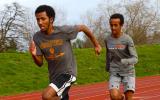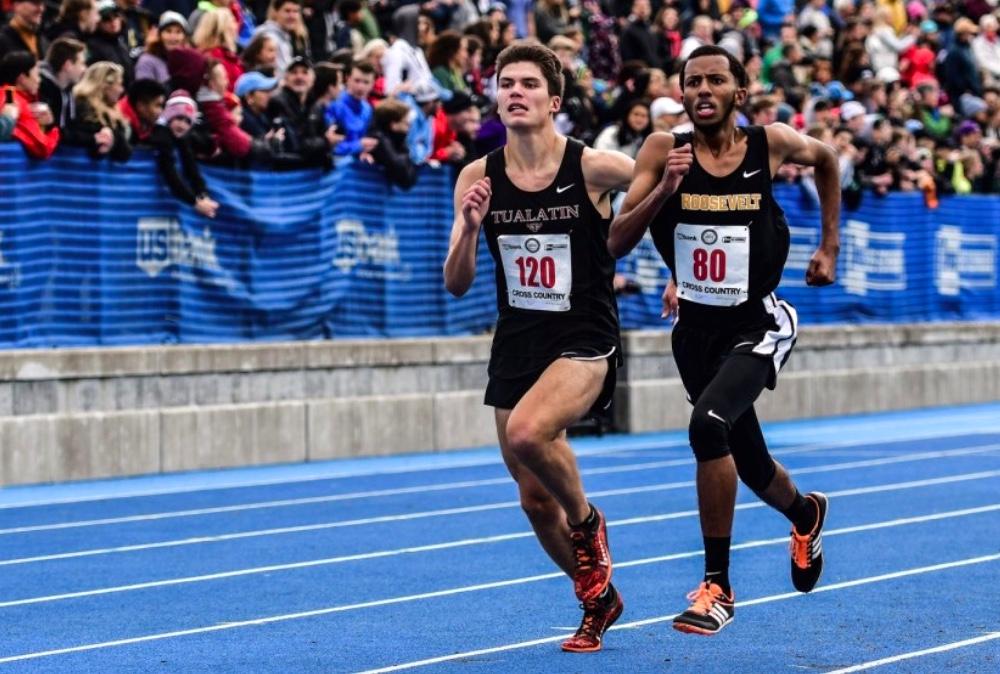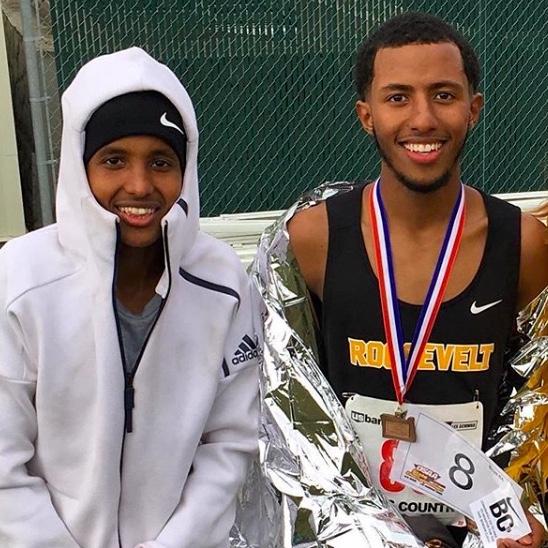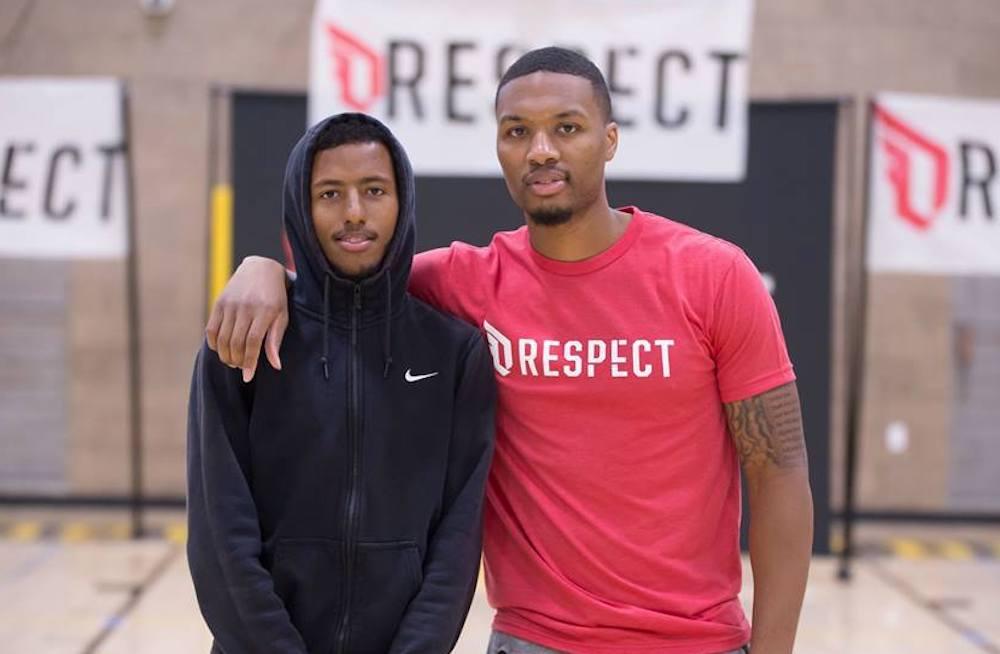Folders |
Riders On The Rise - Faith, Family, Friendship On a Corner In PortlandPublished by
‘Riders on the Rise Faith, family and friendship on a corner in Portland
The morning prayers come first. Lammi slides from his bed in the pre-dawn darkness, rubs sleep from his eyes, finds the floor with his feet. Checks the time on his phone, considers the run ahead. The narrow window before another school day begins. Quietly, with purpose, he performs the ritual washing for Salat al-fajr, the “near dawn” prayer, first of five he’ll complete before the day is though. In his family’s modest North Portland home, he orients his body toward Mecca, moves through the rote supplications, the memorized recitations from the Quran. Begins his day with discipline, commitment, the solemnity of an offering. He taps out a text message to his friend Abdi, down the street — You up yet? Abdi should be awake, too, praying and preparing, but he often oversleeps. Stays up too late for his own good. It’s a running joke between them: Lammi waiting for Abdi. Lammi laces his sneakers, eases from the house into the bracing chill outside, the enveloping darkness of near dawn. He shakes out his lanky legs, jogs toward the familiar corner, their meeting place, the halfway point between his house and Abdi’s.
* * *
When Lammi Kalil stepped onto the dais at the 2017 Oregon 6A Cross Country Championship, after finishing eighth in 15 minutes, 59 seconds, it represented more than a personal breakthrough for the senior from Roosevelt High in Portland. He became the first runner from the school to finish in the top eight in almost 70 years. But if the black and gold, Roosevelt-lettered singlet seemed incongruent among more familiar names like Jesuit and Sunset, the finish wasn’t exactly a revelation for Kalil or his coaches. “It wasn’t really a surprise he got eighth,” one of his coaches, Jake Stout, says now. “I think, on a great day, he could’ve probably been top five.” In the fall of 2016, Kalil was the first state qualifier from Roosevelt in almost a decade, rallying for 18th in what was, at the time, one of the best finishes ever by a Roughrider. After another year of solid work, a podium finish in 2017 seemed possible. That didn’t make it any less sweet. “It was actually mind-blowing,” Kalil says. “We talked about it before the season, how we can definitely get top 10, but I still didn’t know…” Stout, a local physical therapist and collegiate runner at Willamette University, shares responsibilities with head coach Jonquil Vann-Tessmer, a Roosevelt school psychologist who was convinced to mentor the cross country and track teams four years ago. Working together, they’ve revitalized a running program that had been hit with a rotating cast of coaches and participation numbers that dwindled to the single digits. Kalil has been a key component of that renaissance. “We started this program together,” Vann-Tessmer says, “when Lammi was in his freshman year, so it’s been all four years.” Kalil had no idea he’d be playing such a pivotal role. A promising, if marginally committed, runner at Cesar Chavez Middle School, he dropped the sport altogether in eighth grade, planning to play basketball instead. Only a well-timed tip from Angel Humphrey, Kalil’s middle school P.E. teacher, sent Vann-Tessmer searching for the quiet, unassuming ninth grader once he arrived at Roosevelt. “The only reason I got him to come out his freshman year,” Vann-Tessmer says, “is because his middle school coach was like, ‘You have got to find this kid.’ So, we went through several avenues to get ahold of his older sister, who got ahold of him.” Even with his sister’s urging, Kalil was noncommittal. “Nah,” he says now, laughing, “I was like, ‘Basketball, basketball...’ and the coaches, they let me know that running was actually something that could take me far.” When Stout joined the staff in the spring of Kalil’s sophomore year, he, too, saw untapped potential. “Jonquil mentioned they had a couple of talented guys on the cross country team, and they were unsure if they were coming out (for track). They were a little banged up, coming off basketball seasons and things like that. The main thing was just getting them healthy, getting them to enjoy running again.” Aware that Kalil had run 4:33 for 1,500 meters in seventh grade, Stout began extending greater support to the promising sophomore. “That (4:33) was pretty much off the couch, at a P.E. class. Anybody that can do that has a certain amount of talent you can work with. I figured, there’s no reason he can’t be one of the best kids in the state.” After a measure of success during spring track, Stout started inviting Kalil on weekend long runs, introducing him to the maze of trails across the river in Forest Park, the benefits of increased mileage on soft surfaces. “I was just trying to make him feel a part of the whole North Portland running community,” Stout says, “rather than just Roosevelt, or just high school running. There’s a bigger world out there.” The increased dedication led to school records and a state qualifier in cross country his junior year. It also thrust him into an unexpected role as pied piper to a rebounding running culture at Roosevelt. “Lammi’s kind of become the face of cross country here,” Vann-Tessmer says. “We’re always saying, ‘Lammi, go see if you can get that kid to come out.’” Kalil’s accomplishments on the trail and track have been matched by his success in helping to grow the program. Last season, the Roosevelt cross country team had more than 25 members. The track team is flourishing as well, with dozens expected this spring. “I’ve seen it grow a lot since my freshman year,” Kalil acknowledges. “People have been coming out, noticing cross country a lot more. The numbers have been growing, it’s been getting stronger.” His most successful recruit might be a kid who wasn’t even attending Roosevelt a year ago. A sophomore transfer who will likely claim all of Kalil’s records before his own career at Roosevelt concludes: Abdinasir Hussein. Known to most as “Abdi.”
* * * They slip from the neighborhood streets like a pair of whispers. Two slender boys, breath visible, marking the way with flashlights. Down a short descent to Columbia Boulevard, where the thrum of tractor trailers — even at this hour — sets their teeth rattling. Their neighborhood, of course, the last development before the sprawl of industrial North Portland yawns wide open, stretching into a disparate mix of railyards and lumber yards, scrap dealers and strip clubs. Truck depots and auto wreckers, glass factories and machine shops. And directly across from their homes in New Columbia, on the far side of the battered railroad tracks that rumble at all hours with mile-long freight trains, the sort of public works that are rarely approved in more affluent enclaves: the Columbia Boulevard Wastewater Treatment Plant. An unassuming compound of neat cement buildings, labyrinthine pipelines, stout holding tanks. All of it recently renovated, deemed environmentally sensitive, but the purpose still inescapable — sewage processing. It’s their destination. Because on certain days, if the wind blows in a direction that doesn’t catch the treated waste, if there aren’t any graffiti-tagged railcars creaking along the tracks to block the way, there’s a perfect run to be had on a trail behind the plant. And so, in the pallid sweep of flashlight beams, Lammi and Abdi set off.
* * *
When he began trying to convince a neighborhood friend to transfer to Roosevelt, Kalil saw much of himself in the younger boy. He and Abdi Hussein both came from large Muslim families. Both had emigrated from African nations — Kalil from Ethiopia, Hussein from Somalia — and both had spent portions of their childhood transitioning through Kenyan refugee camps. Both arrived in the United States at the age of 8. Both fell into basketball in middle school as a way to fit in, make friends, connect with the culture. Both figured they had what it took to continue playing in high school. And both had landed in New Columbia, a community of mixed-income, public and subsidized housing in North Portland, not far from Roosevelt. But while Hussein lives less than a half mile from Kalil, he was commuting by bus an hour each way to Benson Polytechnic on the east side of the city. “We already knew each other,” Kalil says, “it was just a matter of getting him to come to Roosevelt.” First, Kalil convinced his young friend to try track at Benson, and then — after Hussein showed promise his freshman year — he nudged him to transfer to the local high school where they could train together. Kalil sold him on the facilities — including a 2012 state-of-the-art track renovation and an ongoing, $95 million redevelopment of the entire school — and on the effective balance Vann-Tessmer and Stout have struck with their complementary coaching styles. “After that,” Hussein adds, with a sheepish smile, “he had to convince my parents.” The transfer corresponded with Kalil’s ambitious senior year, one in which he’d committed to adding morning runs in hopes of narrowing the gap to harriers from 6A powers like Jesuit and Central Catholic. Hussein was along for the ride, and after both boys missed a month of training in June for the Ramadan fast, Stout laid out a plan to make up the difference. “As I talked to them about the goals they had,” Stout says, “and what they had to do to get there, it became about getting in extra miles in the morning.” While acknowledging the physical benefits, he also pointed to the mental edge they’d gain. “Psychologically, you really feel like you’re putting in more work than everybody else,” Stout said. “When it’s 6 o’clock in the morning and it’s dark out and nobody else is up, and you’re already getting in four or five miles before people even get to school — on top of the physiological benefit, I think it has a large psychological benefit that plays into preparing for districts and state, the competitive part of the season.” Kalil and Hussein fell into a comfortable routine: meeting at the corner halfway between their homes, getting better every morning. Even if Hussein occasionally struggles to make the meet-up. “I’m always texting him,” Kalil says, to amused groans from Hussein. “I’m the boss. He’s still learning, so I’m teaching him the right way. I’m like, ‘Dude, get your sleep.’ He’ll stay up to midnight if he can.” For Vann-Tessmer, the star runner’s mentorship of Hussein is an extension of leadership he’s shown throughout the school. “He’s an incredible human being,” she says, “who doesn’t share that much about himself.” Pressed by his coach, Kalil provides a few details: He maintains a 3.6 grade point average. He participates in a weekend mentoring program that allowed him to spend two weeks last summer at Harvard University, studying computer science. The summer before that: Brown University, for mechanical engineering.
At a school where over 25 languages are spoken, he is bilingual and tri-literate. “My parents,” Kalil says, “they came here for opportunity and education, so I try to take advantage of that. Make sure I prioritize school.” When he discusses the family’s departure from Ethiopia, their time in the refugee camp on the outskirts of Nairobi, Kalil says simply, “There was a lot of chaos, violence and not many educational opportunities. We were escaping all of that.” His father, Aliye, had a successful business growing coffee, but left that behind to provide better opportunities for his seven children. He now works long hours at a factory on Columbia Boulevard, down the road from the wastewater treatment plant. He, too, rises before dawn, before Kalil has said his prayers or met Hussein for the morning run. “He’s gone before I even get up,” Kalil says, shaking his head at that. At the enormity of it all. “He’s sacrificed so much for us.”
* * * Lammi and Abdi cross a footbridge, crest a rise in the trail. The busy boulevard and the settling sewage recede, replaced by a manicured country club to the left, the meandering, turbid waters of the Columbia Slough to the right. The graveled trail hugs the contours of the slough for miles, carved into a levee that separates the watershed from the low-lying land to the north. Here, they might startle a flock of geese from the golf course fairway. Might glance up to see a bald eagle lurching from its nest. The majesty of a Great blue heron gliding to its rookery in the windswept grass. Crazy things. Jetliners dropping from the clouds, wingtips aglow; the ghostly shoulders of Mount Hood, emerging in the distance; a sudden gust unsettling the slough at just the right moment, scattering the first fingers of light from the east. An inarticulate beauty. Something outside of language. So, they keep running. And just as they turn to head back: a frame of neon letters above a horse track, stuttering to life: PORTLAND MEADOWS. The former home to the annual Nike Cross National championship meet. The kind of elite, national-level competition that might have once seemed well beyond the purview of runners from Roosevelt. That once, even with this proximity, might have felt a long way off. Once, maybe, but not now.
* * * Lillard isn’t the only professional athlete Kalil has met. For the last few seasons, Woody Kincaid, a Nike pro who runs for the Bowerman Track Club, has served as a volunteer assistant when his schedule allows. An acquaintance from Stout’s days assisting at the University of Portland, Kincaid found himself sidelined with an injury shortly after his professional career began. Stout invited him to consider helping with the Roosevelt distance squad. “I thought it could be a win-win, to have his expertise with the kids,” Stout says, “and great for him to be in a position where he’s not thinking about his own running every day.” At a practice last fall, Kalil and Hussein were discussing Mo Ahmed, a 2016 Olympian from Canada they’d seen training in North Portland, when Kincaid overheard them. “Coach Woody was like, ‘Oh yeah, Mo’s my teammate,’” Kalil recalls. “He promised that one day he’d get him to come out and talk to us, and he followed through with his promise.” Shortly before the state meet, Kincaid arrived to the Roosevelt track with his Bowerman teammate in tow. “Me and Abdi were just blown away by how their careers have gone, from high school to now,” Kalil says. “Especially Mo, telling us about Rio, how stressful those 10 days were for him. We were just imaging that — the stage he was on, versus the stage we’re on. That motivated us a lot.”
They’d grown accustomed to Kincaid’s presence, but both boys were somewhat star struck by Ahmed, in no small part because the Somali native shares a similar story of immigration and resettlement. “That was pretty impressive,” Kalil says, “especially for Abdi. They spoke the same language.” “We did,” Hussein confirms. “We mostly spoke in English, but some Somali. He used to play basketball, too. It was just so relatable to us.” As Ahmed told Olympic stories, detailed his pre-race routines and passed out complementary gear, Stout could see the impact on his young charges. “It’s kind of like showing someone a mirror,” he says, “and they’re able to see there’s not a ton of difference between me and this guy. I could have this kind of success if I put in the work.” Hussein shares a similar sentiment. “He told us how far he came, and we were like, ‘That could be us, almost.’ We had that picture…That’s why we’ve been really motivated this winter.” Shortly after the visit from Kincaid and Ahmed came the 6A cross country meet, where the Roosevelt pair finished eighth and 43rd, easily one of the best showings for the school in decades. That momentum has continued unabated through the winter. Although Oregon lacks an official indoor season, both competed unattached at a February invitational on the University of Washington’s 307-meter undercover oval at the Dempsey Indoor facility. In the 3,000-meter race, Kalil finished seventh in a personal-best 8:48.86. Hussein wasn’t far behind, hitting 8:54.58 for 11th place. The top two 3K times in school history — indoors or out. Remarkably, almost every time Kalil sets a new personal best, at any distance, it enters the books as a school record — at an institution that’s been around for nearly 100 years. But even as he sets these marks, he accepts the likelihood they’ll be gone within a year or two. “I thought they were going to last a long time,” he says, jabbing his chin playfully at Hussein, “but then he came here from Benson. I told him, ‘You’re going to beat all my records.’ He’s already got some of my sophomore ones.” Hussein isn’t shy about his eventual ambitions. “I have my eyes set on the sophomore records, and even the state records. The big records.” Kalil is considering his options for college as he prepares for his final campaign as a Roughrider. He has two sisters at the University of Washington and a brother at Portland State, but recent accomplishments have him weighing possibilities at a range of schools across the western U.S. For now, the two friends stand at the cusp of a promising outdoor track season. It’s a friendship grounded on faith, family and a corner where they meet each morning. “We push each other every day,” Kalil says. “If I get lazy, he’ll push me, saying ‘C’mon man, remember your goal.’ We push it together every day.”
History for Roosevelt High School Track & Field and Cross Country - Portland, Oregon
Show 7 more
|








 When Portland Trail Blazers guard, Damian Lillard, visited Roosevelt to launch his RESPECT motivational program at a school-wide assembly, Kalil was one of the student leaders chosen to meet with the basketball star.
When Portland Trail Blazers guard, Damian Lillard, visited Roosevelt to launch his RESPECT motivational program at a school-wide assembly, Kalil was one of the student leaders chosen to meet with the basketball star.